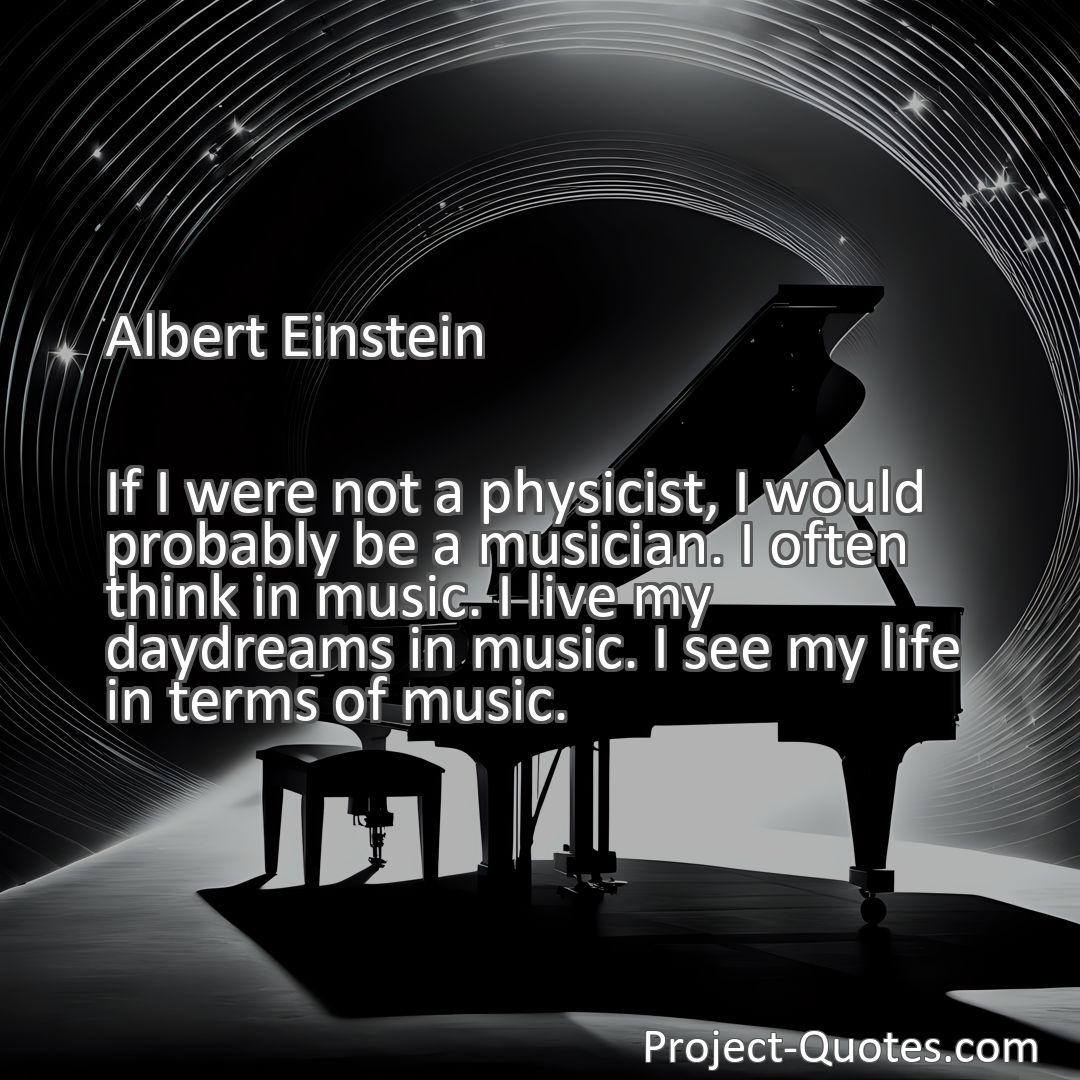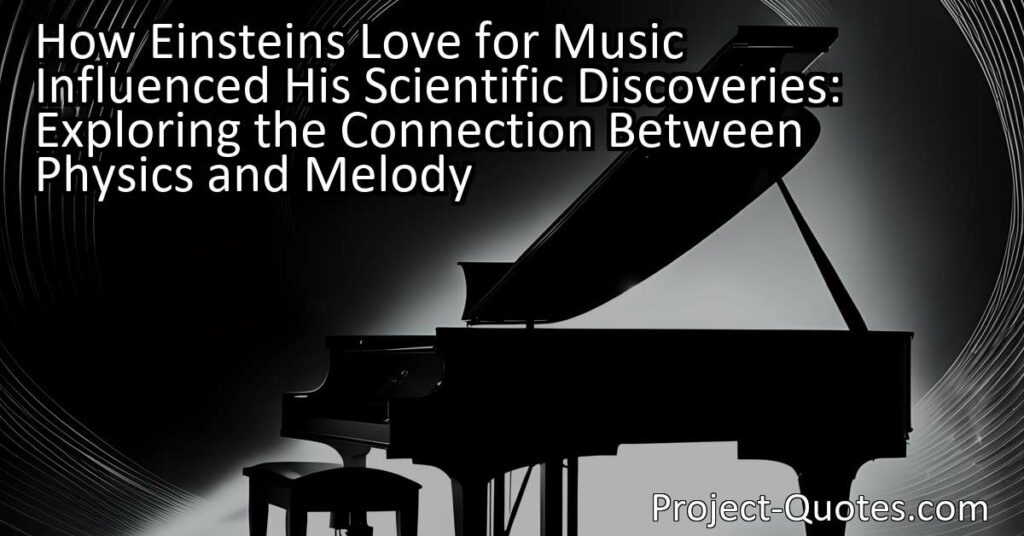If I were not a physicist, I would probably be a musician. I often think in music. I live my daydreams in music. I see my life in terms of music.
Albert Einstein
How Einstein’s Love for Music Influenced His Scientific Discoveries: Exploring the Connection Between Physics and Melody Discover how Einstein’s passion for music influenced his scientific discoveries. Explore the commonalities between music and physics, and learn how approaching learning and problem-solving with a musical mindset can inspire creativity and new possibilities. Just like Einstein, let the music in your heart inspire the thoughts in your mind and watch as your daydreams take on a rhythm all their own.
Table of Contents
- 1 If I were not a physicist, I would probably be a musician. I often think in music. I live my daydreams in music. I see my life in terms of music.
- 2 Albert Einstein
- 3 Meaning of Quote – If I were not a physicist, I would probably be a musician. I often think in music. I live my daydreams in music. I see my life in terms of music.
- 4 Freely Shareable Quote Image
- 5 Related
Meaning of Quote – If I were not a physicist, I would probably be a musician. I often think in music. I live my daydreams in music. I see my life in terms of music.
If you pause for a moment and listen to the world around you, you might hear the hum of life almost like a soundtrack playing in the background. It’s easy to forget that our lives, much like songs, have a rhythm, a melody, and sometimes, even a chorus of voices that join in. Albert Einstein, a man whose name is synonymous with genius and who changed the way we understand the universe, saw something special in music. He once said, “If I were not a physicist, I would probably be a musician. I often think in music. I live my daydreams in music. I see my life in terms of music.”
Why would a scientist, a man of equations and experiments, hold music so close to his heart? Well, Einstein wasn’t just any scientist; he was an artist in his own field. And that’s where our exploration begins, with the art that is music and the poetry that is physics.
You see, music and physics might seem like they’re worlds apart, but they actually share a lot in common. They both look for patterns, deal with complex concepts, and seek to understand the nature of reality. In ways, they’re both attempts to explain the universewhether it’s through the mathematical language of physics or the emotional expression of music.
Einstein’s love for music began when he was just a kid. He learned to play the violin and found joy and comfort in the melodies he could create. He wasn’t just going through the motions; he was feeling the music with every part of his being. It’s like when you’re lost in your favorite song, and the world seems to stop just for those few minutes. That kind of passion, the sort that fills your entire soul, was what music was for Einstein.
Perhaps it was this passion for music that actually made Einstein a better physicist. He understood the beauty of the natural world and could start to see the patterns within it as one might see the structure of a beautiful symphony. Nature’s music isnt one you hear with your ears, but rather with your mind and heart. The orbits of planets, the dance of particles too small to see, and the vastness of the star-filled skyall of these can be seen as parts of a cosmic symphony.
In music, you have notes that come together to form chords, and these chords work together to create a song. In the universe, you have fundamental forces and particles that interact and bind to form the fabric of space and time. Einstein saw his scientific discoveries much like how a composer views a new compositiona series of laws and principles that come together to make the music of the spheres.
When you think about it, learning anything, whether it’s physics, music, or another subject, is a lot like learning to play an instrument. At first, it’s tricky and a little overwhelming. You have to practice, make mistakes, and sometimes you might feel like giving up. But with time and patience, you start to see progress. The notes start to flow more smoothly, the equations start to make sense, and what once felt like a foreign language becomes a beautiful form of expression.
For Einstein, thinking in music helped him imagine new possibilities. He would use his violin to help clear his mind and inspire his thoughts. Have you ever listened to a song and suddenly felt a spark of creativity? Somehow, in the tangle of lyrics and melodies, your mind works differently, and the solution to a problem you’ve been stuck on just appears. That’s a bit like what Einstein experienced with his daydreams in music.
Now, let’s talk about how this concept of seeing life in terms of music can be reflected in our own lives. Our daily routines, our habits, our conversationsthey are all part of the unique soundtrack that defines who we are. Our joys are the crescendos, our sorrows the minor keys. And just like a well-crafted song, our lives have a dynamic ebb and flow. Some days are like a bold, exciting rock anthem, while others may be as tender as a lullaby.
Imagine how different people’s soundtracks would be! An athlete might have a powerful, energetic playlist, pushing them further in their training. A painter might live in a soundscape of gentle tunes and broad, sweeping orchestral pieces that fuel their broad brushstrokes. Just like these individuals, Einstein let music guide his thoughts and ideas.
In the grand concerto of life, we all have moments when we are the soloist, standing out with our own individual melodies. But much of our existence is also about harmony, about how our sounds fit with othersa friend’s laughter that blends with our own, a family member’s advice that complements our thoughts, a teacher’s wisdom that sets the rhythm for learning something new.
Einstein showed us that even a mind as logical and mathematically inclined as his could be profoundly influenced by the arts. It’s a reminder that we are all multidimensional, that we don’t just have to be “one thing.” You can love science and find joy in the pages of a storybook. You can be a mathematician and still appreciate the brush strokes of a painting. Just like Einstein could contemplate the laws of physics while bowing the strings of his violin.
In essence, Einsteins connection to music symbolizes the bond between the logical and the creative, the analytical and the expressive. It reminds us that in our pursuit to understand the world and our place in it, there is room for both numbers and notes, equations and melodies.
Turn the page, pluck the string, calculate the equationwhatever you do, remember that life can be as beautiful and intricate as the most complex symphony. Just like Einstein, let the music in your heart inspire the thoughts in your mind, and watch as your daydreams take on a rhythm all their own.
I hope this quote inspired image brings you hope and peace. Share it with someone who needs it today!


